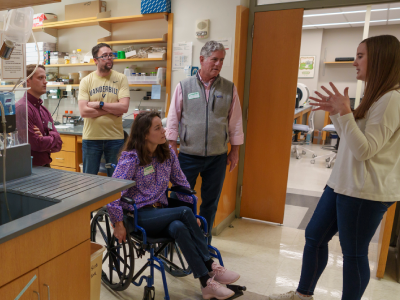Stephen Doster
-

The Caprioli Way
It started with a hacksaw and a multimillion-dollar instrument. Richard Caprioli, then a postdoctoral fellow, was given the saw to cut the instrument in half during his first day of his postdoctoral studies. It was the day that Caprioli, now Stanford Moore Professor of Biochemistry, developed a desire to “do innovative things” with mass spectrometry instruments.” This yearning resulted in him becoming a pioneer of new mass spec techniques, including imaging mass spec. Read MoreJul. 8, 2024
-

Vestigo Issue 1
From the dean Basic science at Vanderbilt University: A Brief History A Nobel-worthy discovery spawns a new field—and new therapies Cell and Developmental Biology pushes the limits of cancer research Diabetes discoveries: Transforming understanding and care Pharmacology’s tradition of academic excellence and mentorship… Read MoreApr. 18, 2024
-

Walter Chazin
Walter Chazin, Ph.D., received a B.Sc. in chemistry from McGill University in 1975 and a Ph.D. in chemistry from Concordia University in Montreal in 1983. He was a postdoctoral fellow in the lab of Kurt Wüthrich at the E.T.H. in Switzerland (2002 Nobel laureate in Chemistry). After 13… Read MoreMar. 28, 2024
-

Taking a Bite Out of Charcot-Marie-Tooth Disease
“You’re nervous because you don't know what to expect and excited to see whatever it is you get to see,” Schlafly said of the visit. "I had seen a lab before, but I must say, it’s a pretty humbling experience to go from thinking there is no one at all who knows about your really weird, rare disease to walking into a lab and learning that everyone there is in some way working to cure my issue.” Read MoreMar. 18, 2024
-

Immune response authority Karen Adelman to deliver Apex Lecture on April 10
Immune response authority Karen Adelman will present the Vanderbilt School of Basic Sciences Apex Lecture on April 10, 2024. Read MoreMar. 13, 2024
-

Immune research authority Robert Tampé to deliver Apex Lecture on March 7
Immune research authority Robert Tampé will present the Vanderbilt School of Basic Sciences Apex Lecture on March 7, 2024. Read MoreFeb. 21, 2024
-

Signal transduction authority Xuewu Zhang to deliver Apex Lecture on March 4
Signal transduction authority Xuewu Zhang to present the Vanderbilt School of Medicine Basic Sciences Apex Lecture on March 4, 2024. Read MoreFeb. 16, 2024
-

The Rising Bar for High-impact Papers
By Chuck Sanders, Vice Dean of the Vanderbilt School of Medicine Basic Sciences Everyone, including me, has strong opinions about the most prestigious scientific journals such as Cell, Science, and Nature, but we all agree we’d like our papers to be published in these “pinnacle” venues! At least in an… Read MoreFeb. 14, 2024
-

Immune research authority Robert Tampé to deliver Apex Lecture on March 7
Immune research authority Robert Tampé to present the Vanderbilt Basic Sciences Apex Lecture March 7. Read MoreFeb. 13, 2024
-

Signal transduction authority Xuewu Zhang to deliver Apex Lecture on March 4
Signal transduction authority Xuewu Zhang to present the Vanderbilt Basic Sciences Apex Lecture March 4. Read MoreFeb. 13, 2024